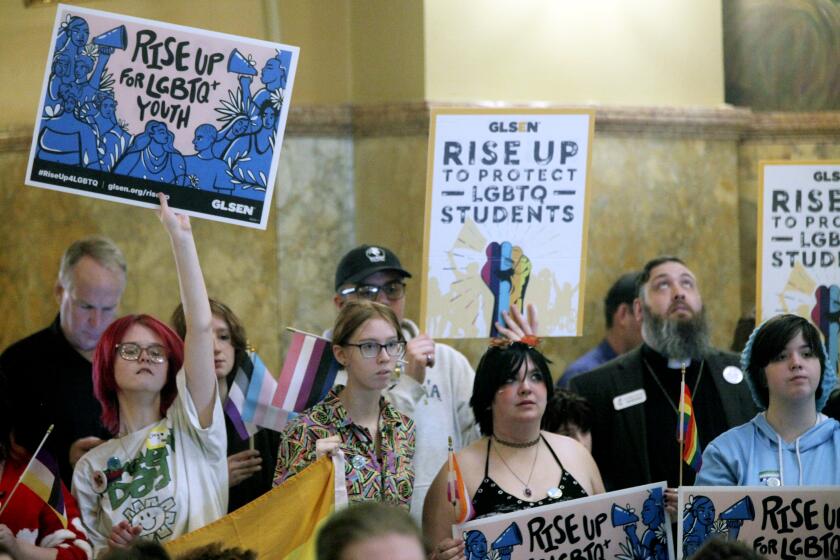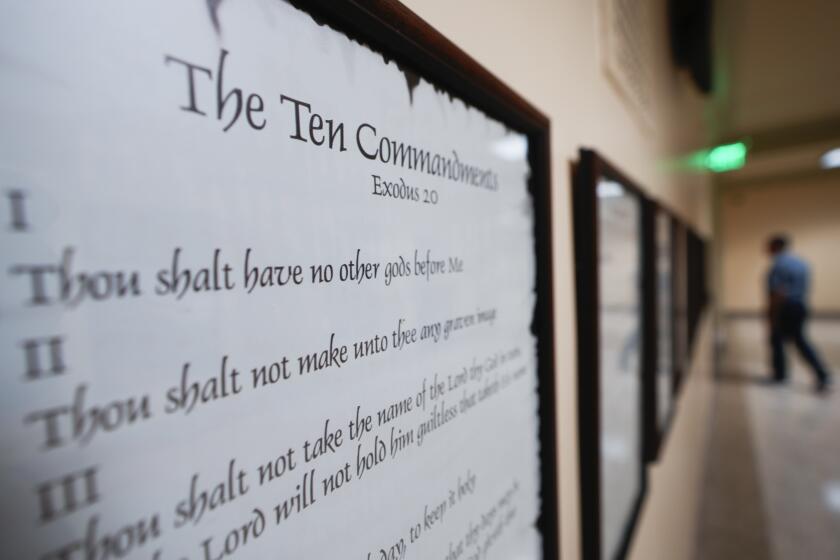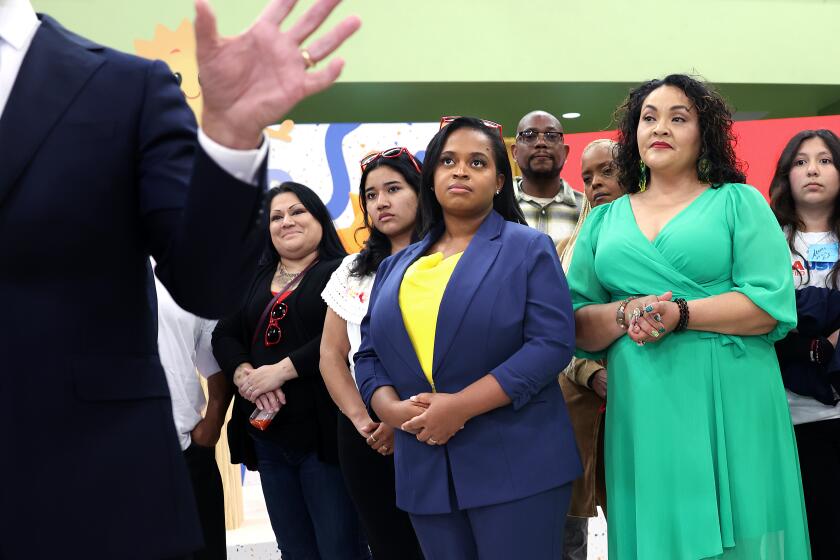Trekking Through College : Classes Explore Modern Society Using the World of ‘Star Trek’
College: the final frontier. Academe’s ivied halls and gleaming buildings are where great minds gather to discuss Plato, Nietzsche and . . . “Star Trek”?
Twenty-odd years after the original “Star Trek” television series called it quits, a small armada of college students and instructors live campus life a la Trek. Whether in formal clubs or at informal TV parties, they collect books and watch the program’s various incarnations--reruns of the original science fiction series, sequels “Star Trek: The Next Generation” and “Star Trek: Deep Space Nine,” and the full-length “Star Trek” films.
Golden West College in Huntington Beach has its share of Trekkers, many of whom threw a party in January to celebrate the TV premiere of “Voyager,” the newest sequel to the show. UC Irvine student Trekkers pick up comic books based on the series at their campus’ “alt.ant” store, and sources recently confirmed that, yes, even UC Irvine Chancellor Laurel L. Wilkening is a Trekker.
“ ‘Star Trek’ is a hope or a vision,” said Ed Dansby, 22, a Golden West College student. “People think, hopefully, that will be our future.”
But college isn’t just a place to be a fan; it’s a place to study the metaphor and meaning of the cult hit’s characters, from its paragons to its pariahs. It’s about mythology. Philosophy. Social commentary.
“The idea behind ‘Star Trek’ is it’s intellectually stimulating,” said Cal State Northridge film professor Nate Thomas. “It says something about technology and imagination.”
UCLA film and television student Daniel Bernardi can speak to its cultural relevance. Bernardi is analyzing race relations on TV in a dissertation titled “The Wrath of Whiteness: The Meaning of Race in the Generation of ‘Star Trek.’ ”
Professors and lecturers nationwide are picking up the cue. They plaster office walls with Trek posters. They use the show in the classroom to illustrate ideals, concepts, intellectual theories. As “Star Trek” extends its tendrils into the world of higher education, it is boldly going where no TV show has gone before.
The Trekker movement traces its roots to the relatively few fans who watched the original show during its first run in the late 1960s. It gained a larger and more loyal following when the show was syndicated during the 1970s and ‘80s, fans say, and picked up young viewers in its reincarnation as “The Next Generation.”
“A decade or so ago, if you were a ‘Star Trek’ fan and you weren’t a geek, you were in the closet,” said Kenneth Carter, one of the teachers of a “Star Trek” course at the University of Alabama at Birmingham. “You were embarrassed about it, but you didn’t know why. Now it’s OK to say you’re a fan.”
Not only is it OK, but there are endless fandom outlets. There are conventions, fanzines and “Star Trek” role-playing games waged on the Internet, the telecommunications network linking millions of computers worldwide. There’s the Klingon Language Institute in Pennsylvania, which has translated the Bible into the language of the Klingons, a “Star Trek” race of extraterrestrials.
Some fans use on-line computer connections to offer their own “Star Trek” story lines, which go so far as to link the macho Capt. James T. Kirk of the original series and the Vulcan Spock as gay lovers.
“People appropriate ‘Star Trek’ to fit their own needs, and they stretch the boundaries,” UCLA’s Bernardi said. “I say, ‘Leave Spock alone!’ But they’re taking (the story) places it can’t go on television.”
The “Star Trek” story is a way for college students with similar interests to get together, much like the Monday-night gaggles of friends who watch the 20-something soap “Melrose Place.” Bernardi said one friend, a doctoral student, used to beg him to go to Thursday night “Star Trek” viewing parties at UCLA.
“Star Trek” also has spawned a collection of courses and is carving out a small niche in academia.
UCLA’s Bernardi sees “Star Trek” as fertile ground for reflection on modern society. He is examining Trek television programs from the 1960s to the 1990s for their portrayals of race, much as scholars would pick apart literature or artistic films. “ ‘Star Trek’ is one of the first programs to be analyzed in a trend that is, in itself, initial,” he said.
His analysis is a serious effort, he said, but still, “when I tell people I explore ‘Star Trek,’ they snicker.”
On some campuses, “Star Trek” has won a place amid rigorous teaching. Nim Batchelor, chairman of the philosophy department at Elon College in North Carolina, said his course--”Philosophy in ‘Star Trek’ “--relates episodes to philosophers such as Plato, Descartes and John Locke.
He explores abortion, whether androids should get equal rights, ethics and the meaning of life. “The aim of the course is to get students interested in philosophy in a way that is somewhat more enjoyable than the usual ‘Read this old text’ approach,” Batchelor said.
Some use “Star Trek” in academic studies, such as a faculty member at Randolph-Macon College in Virginia who researches memory by testing “Star Trek” fans’ trivia knowledge. One engineering school in the Midwest awarded an honorary engineering degree to actor James Doohan, who portrayed Scotty--the chief engineer--on the original 1960s series.
But at the bottom of the phenomenon, some college students say, is a need to hear a good story about the uncharted frontier: the time to come.
“What’s ultimately the most positive about ‘Star Trek’ is that it’s creating communities where people talk about the future,” Bernardi said. “It skirts the line between fiction and the possibilities of the imagination.”
More to Read
Sign up for our Book Club newsletter
Get the latest news, events and more from the Los Angeles Times Book Club, and help us get L.A. reading and talking.
You may occasionally receive promotional content from the Los Angeles Times.






